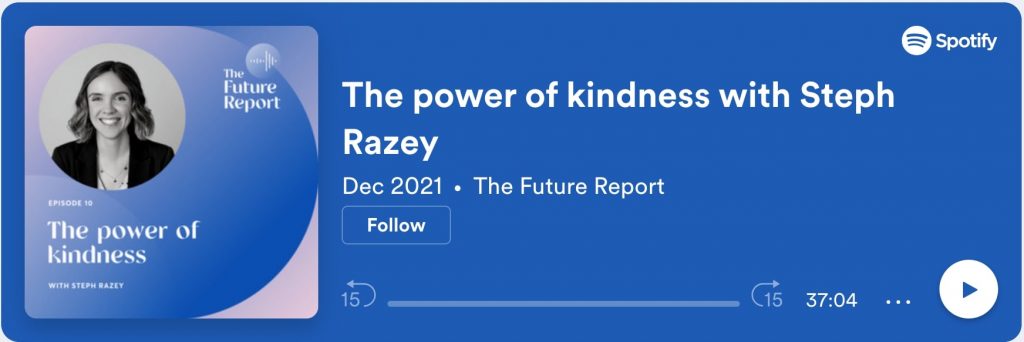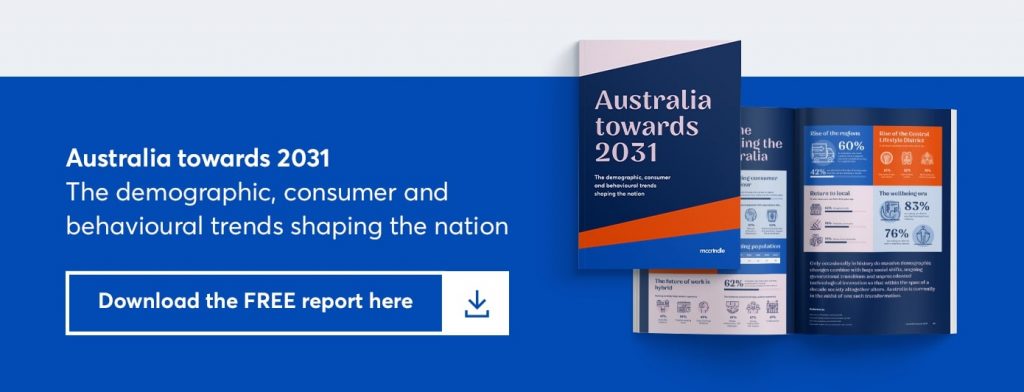By: McCrindle
Can you remember a time in your life when someone showed you an act of kindness? How about the last time you showed kindness to someone? Are you intentional about being kind, or do you wait for opportunities to present themselves?
It is universally acknowledged that it is cool to be kind. From Ancient Greek Philosopher Aesop who said, “No act of kindness is ever wasted”, to Mother Theresa who said, “Kind words can be short and easy to speak, but their echoes are truly endless.” Drawing on research we conducted for Helga’s about kindness, in this blog and podcast, we address why kindness is so important, and how you can be more kind.
Understanding kindness
The framework we developed to gain a better understanding of what kindness looks like is outworked in three key virtues. These are empathy, altruism and reflection. Each of these work together and to have a kind society, you can’t have one without the other.

Empathy is the sense of connection one feels to others and how this can move someone to be kind. If you are thinking about the needs of others and are sensing how your actions can impact others, then you are exhibiting empathy. Showing compassion to others is important in having an empathetic kindness.
Altruism explores how much a person is willing to give and hand over to others, without expecting anything in return. This is important in kindness because while we can show kindness in hopes to have that favour returned, a beautiful part of kindness is being able to show it without a greater motive behind it. Altruism boils down to an element of trust because when being kind, you must trust that what you share or give is going to be received well and not taken advantage of.
Reflection is about how much one pauses to consider their thoughts or actions and how much they are willing to be patient, gentle and tolerant of others. It challenges us to think about the self-control or discipline we might have to make sure we are choosing to be kind over more selfish desires.
The most common acts of kindness and what we want to see more of
Australians are kind with their words or with kind gestures. Specifically, people are most likely to show kindness by holding a door or lift open for someone, giving a compliment or asking if someone is okay. Even kind acts like saying hi to someone walking past on the street is a regular occurrence.

The acts of kindness people want more of are positively in line with many of the acts of kindness they are already performing. Aussies are seeking the more relational acts of kindness such as asking if someone is ok, helping someone in need, saying hi to someone you walk past on the street and giving someone a compliment.
Barriers to being kind
While many acknowledge that being kind is the right thing to do, it may not always be the easy thing to do. The biggest barriers people face with kindness is being out of their comfort zone, not knowing how their kindness will be received or not knowing what they should even do. It is important to overcome these as people who face barriers to being kind perform almost four less acts of kindness every week compared to those who face no barriers to being kind. When we extrapolate that out, if we were to overcome these barriers, we might see an additional two billion acts of kindness performed across Australia each year!
Why kindness is important
Kindness helps to give people a sense of belonging, not just a one-off warm feeling. In fact, kindness can have positive long-term impacts. In the research, we asked Australians what some of the most memorable acts of kindness they have received are. One Baby Boomer told this story: “In 1952, I was at a fete at about age 5. They were giving horse rides for 6p. I had no money and I said out loud “I wish I could have a ride” and a lady gave me sixpence. I had my horse ride, it was wonderful. I am now 74 and have never forgotten that day. My only regret is I didn’t thank the lady, I was so excited that I ran home to tell my mother.” This story reminds us why being kind is important – because it can make a lasting impression and spur others on to be kind, creating a ripple effect. Additionally, kindness also benefits the individual. Being kind can boost your own happiness levels because it increases serotonin and dopamine – the neurotransmitters that create the feeling of satisfaction. Kindness also increases your sense of connection to others.
Start today!
The great thing about kindness is that it is easy to start straight away. It could be something as simple as sending someone an encouraging text message, offering to make your coworker a tea or coffee or letting someone in front of you in traffic. When social psychologist, author and social research Hugh Mackay was reflecting on the kindness research, he noted that all of us have an innate capacity for kindness and that we especially see this exhibited when we are faced with challenging situations. He says, “We get distracted, all kinds of things occupy our attention, and we sometimes neglect this capacity we have. But give us an emergency, life threatening illness, relationship breakdown, retrenchment or on a societal scale a bushfire, flood, war or pandemic and watch us revert to our natural state which is to be kind, compassionate, caring and respectful of each other’s needs.” This serves as a great reminder to us all to not wait for the next pandemic to show a neighbour a bit of extra kindness.
Article supplied with thanks to McCrindle.
About the Author: McCrindle are a team of researchers and communications specialists who discover insights, and tell the story of Australians – what we do, and who we are.
Feature image: Photo by Vitolda Klein on Unsplash


